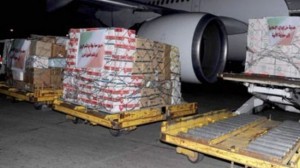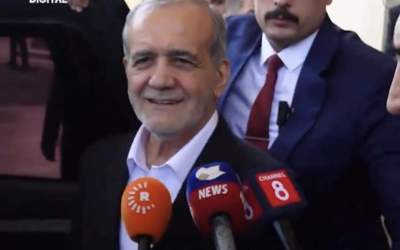 TEHRAN (FNA)- A senior Iranian diplomat stressed that Tehran has sent different humanitarian aids to the Syrian people after the western states imposed agricultural and medical sanctions on the Muslim country and rebels destroyed their farms and infrastructures.
TEHRAN (FNA)- A senior Iranian diplomat stressed that Tehran has sent different humanitarian aids to the Syrian people after the western states imposed agricultural and medical sanctions on the Muslim country and rebels destroyed their farms and infrastructures.�The Islamic Republic of Iran has sent medicines, medical equipment and a few ambulances to Syria,� said Deputy Iranian Ambassador to Damascus Abbas Golrou, adding that the fourth consignment of Iranian nation's humanitarian aids for Syrian people was delivered to the officials from Syria�s Health Ministry on Sunday.
He stressed the importance of helping Syrian patients as a �humanitarian and moral duty� at the current juncture when Damascus is suffering from economic sanctions.
Early in June, Iranian Ambassador to Damascus Mohammad Reza Rao'uf Sheibani told FNA, "We believe that sanctions against Syria have inflicted the most damage on the Syrian people in a way that they experienced very hard conditions."
He said after sanctions started, rebels looted people's farms and emptied people's crops and grains into silos in Turkey, adding that the rebels destroyed and torched what was left in people's farms.
Rao'uf Sheibani pointed to Iran's assistance and humanitarian aids to the Syrian people, and said, "We have procured one-hundred thousand tons of flour and sent it to Syria in the past 2 to 3 months."
He said that Iran also sent cooking gas, medicines, fertilizers, seeds and other agricultural tools for the Syrians, and said even Iran's Red Crescent Society and health ministry dispatched their aids to the Syrian refugees residing in Lebanon and Jordan. Even after the Syrian government demanded, parts of Iran's aids were sent event to the people residing in those areas which are under the control of the terrorists and rebel groups, mentioned the ambassador.
In relevant remarks in May, Jordanian Prime Minister Abdullah Nsour in a meeting with Iranian Foreign Minister Ali Akbar Salehi praised Tehran's assistance to the Syrian refugees sheltering in his country, and underlined Amman's eagerness to further develop the ties with Iran.
During the meeting in Amman at the time, Nsour pointed to the problems in the region, including the Syrian crisis, and expressed the hope that regional developments will soon lead to peace and tranquility.
He also referred to the problems created for his country after the arrival of thousands of Syrian refugees, and said Amman has called on the international organizations to assist the country in this regard.
Nsour hailed Iran's humanitarian aids to the Syrian refugees in Jordan, and underscored that Amman is willing to further expand bilateral relations with Tehran.
Syria has been experiencing unrest since March 2011 with organized attacks by well-armed gangs against Syrian police forces and border guards being reported across the country.
Hundreds of people, including members of the security forces, have been killed, when some protest rallies turned into armed clashes.
The government blames outlaws, saboteurs, and armed terrorist groups for the deaths, stressing that the unrest is being orchestrated from abroad.
In October 2011, calm was almost restored in the Arab state after President Bashar al-Assad started a reform initiative in the country, but Israel, the US and its Arab allies sought hard to bring the country into chaos through any possible means. Tel Aviv, Washington and some Arab capitals have been staging various plots to topple President al-Assad, who is well known in the world for his anti-Israeli stances.
By Fars News Agency
The Iran Project is not responsible for the content of quoted articles.










